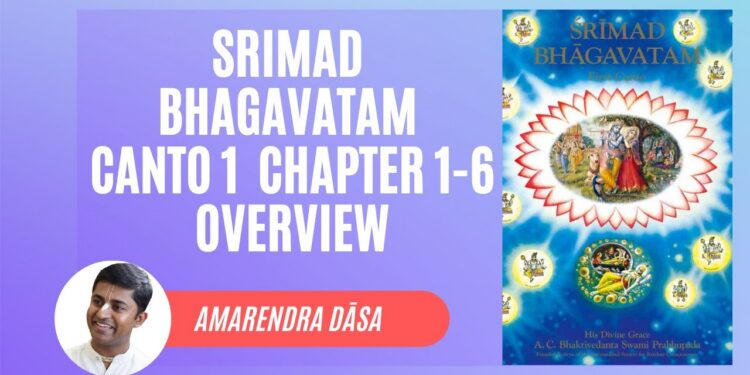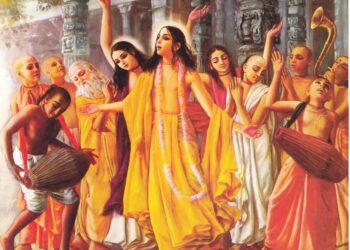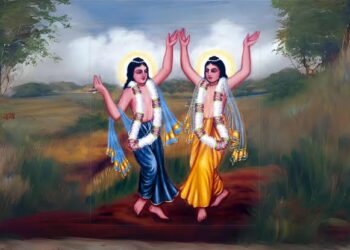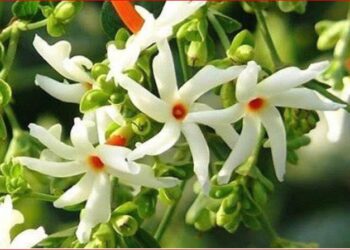Srimad Bhagavatam, Canto 1, Chapter 1
The following three verses are from Srimad Bhagavatam, Canto 1, Chapter 1. In the video move to 12min:10sec, where HG Amarnath Prabhu will recite them very beautifully.
TEXT 1
oṁ namo bhagavate vāsudevāya
janmādy asya yato ‘nvayād itarataś cārtheṣv abhijñaḥ svarāṭ
tene brahma hṛdā ya ādi-kavaye muhyanti yat sūrayaḥ
tejo-vāri-mṛdāṁ yathā vinimayo yatra tri-sargo ‘mṛṣā
dhāmnā svena sadā nirasta-kuhakaṁ satyaṁ paraṁ dhīmahi
SYNONYMS
om—O my Lord; namaḥ—offering my obeisances; bhagavate—unto the Personality of Godhead; vāsudevāya—unto Vāsudeva (the son of Vasudeva), or Lord Śrī Kṛṣṇa, the primeval Lord; janma-ādi—creation, sustenance and destruction; asya—of the manifested universes; yataḥ—from whom; anvayāt—directly; itarataḥ—indirectly; ca—and; artheṣu—purposes; abhijñaḥ—fully cognizant; sva-rāṭ—fully independent; tene—imparted; brahma—the Vedic knowledge; hṛdā—consciousness of the heart; yaḥ—one who; ādi-kavaye—unto the original created being; muhyanti—are illusioned; yat—about whom; sūrayaḥ—great sages and demigods; tejaḥ—fire; vāri—water; mṛdām—earth; yathā—as much as; vinimayaḥ—action and reaction; yatra—whereupon; tri-sargaḥ—three modes of creation, creative faculties; amṛṣā—almost factual; dhāmnā—along with all transcendental paraphernalia; svena—self-sufficiently; sadā—always; nirasta—negation by absence; kuhakam—illusion; satyam—truth; param—absolute; dhīmahi—I do meditate upon.
TRANSLATION
O my Lord, Śrī Kṛṣṇa, son of Vasudeva, O all-pervading Personality of Godhead, I offer my respectful obeisances unto You. I meditate upon Lord Śrī Kṛṣṇa because He is the Absolute Truth and the primeval cause of all causes of the creation, sustenance and destruction of the manifested universes. He is directly and indirectly conscious of all manifestations, and He is independent because there is no other cause beyond Him. It is He only who first imparted the Vedic knowledge unto the heart of Brahmājī, the original living being. By Him even the great sages and demigods are placed into illusion, as one is bewildered by the illusory representations of water seen in fire, or land seen on water. Only because of Him do the material universes, temporarily manifested by the reactions of the three modes of nature, appear factual, although they are unreal. I therefore meditate upon Him, Lord Śrī Kṛṣṇa, who is eternally existent in the transcendental abode, which is forever free from the illusory representations of the material world. I meditate upon Him, for He is the Absolute Truth.
TEXT 2
dharmaḥ projjhita-kaitavo ‘tra paramo nirmatsarāṇāṁ satāṁ
vedyaṁ vāstavam atra vastu śivadaṁ tāpa-trayonmūlanam
śrīmad-bhāgavate mahā-muni-kṛte kiṁ vā parair īśvaraḥ
sadyo hṛdy avarudhyate ‘tra kṛtibhiḥ śuśrūṣubhis tat-kṣaṇāt
SYNONYMS
dharmaḥ—religiosity; projjhita—completely rejected; kaitavaḥ—covered by fruitive intention; atra—herein; paramaḥ—the highest; nirmatsarāṇām—of the one-hundred-percent pure in heart; satām—devotees; vedyam—understandable; vāstavam—factual; atra—herein; vastu—substance; śivadam—well-being; tāpa-traya—threefold miseries; unmūlanam—causing uprooting of; śrīmat—beautiful; bhāgavate—the Bhāgavata Purāṇa; mahā-muni—the great sage (Vyāsadeva); kṛte—having compiled; kim—what is; vā—the need; paraiḥ—others; īśvaraḥ—the Supreme Lord; sadyaḥ—at once; hṛdi—within the heart; avarudhyate—become compact; atra—herein; kṛtibhiḥ—by the pious men; śuśrūṣubhiḥ—by culture; tat-kṣaṇāt—without delay.
TRANSLATION
Completely rejecting all religious activities which are materially motivated, this Bhāgavata Purāṇa propounds the highest truth, which is understandable by those devotees who are fully pure in heart. The highest truth is reality distinguished from illusion for the welfare of all. Such truth uproots the threefold miseries. This beautiful Bhāgavatam, compiled by the great sage Vyāsadeva [in his maturity], is sufficient in itself for God realization. What is the need of any other scripture? As soon as one attentively and submissively hears the message of Bhāgavatam, by this culture of knowledge the Supreme Lord is established within his heart.
TEXT 3
nigama-kalpa-taror galitaṁ phalaṁ
śuka-mukhād amṛta-drava-saṁyutam
pibata bhāgavataṁ rasam ālayaṁ
muhur aho rasikā bhuvi bhāvukāḥ
SYNONYMS
nigama—the Vedic literatures; kalpa-taroḥ—the desire tree; galitam—fully matured; phalam—fruit; śuka—Śrīla Śukadeva Gosvāmī, the original speaker of Śrīmad-Bhāgavatam; mukhāt—from the lips of; amṛta—nectar; drava—semisolid and soft and therefore easily swallowable; saṁyutam—perfect in all respects; pibata—do relish it; bhāgavatam—the book dealing in the science of the eternal relation with the Lord; rasam—juice (that which is relishable); ālayam—until liberation, or even in a liberated condition; muhuḥ—always; aho—O; rasikāḥ—those who are full in the knowledge of mellows; bhuvi—on the earth; bhāvukāḥ—expert and thoughtful.
TRANSLATION
O expert and thoughtful men, relish Śrīmad-Bhāgavatam, the mature fruit of the desire tree of Vedic literatures. It emanated from the lips of Śrī Śukadeva Gosvāmī. Therefore this fruit has become even more tasteful, although its nectarean juice was already relishable for all, including liberated souls.
Srimad Bhagavatam, Canto 12, Chapter 13
TEXT 23
nāma-saṅkīrtanaṁ yasya
sarva-pāpa praṇāśanam
praṇāmo duḥkha-śamanas
taṁ namāmi hariṁ param
SYNONYMS
nāma-saṅkīrtanam—the congregational chanting of the holy name; yasya—of whom; sarva-pāpa—all sins; praṇāśanam—which destroys; praṇāmaḥ—the bowing down; duḥkha—misery; śamanaḥ—which subdues; tam—to Him; namāmi—I offer my obeisances; harim—to Lord Hari; param—the Supreme.
TRANSLATION
I offer my respectful obeisances unto the Supreme Lord, Hari, the congregational chanting of whose holy names destroys all sinful reactions, and the offering of obeisances unto whom relieves all material suffering.





















🙏🏽🙏🏽🙏🏽